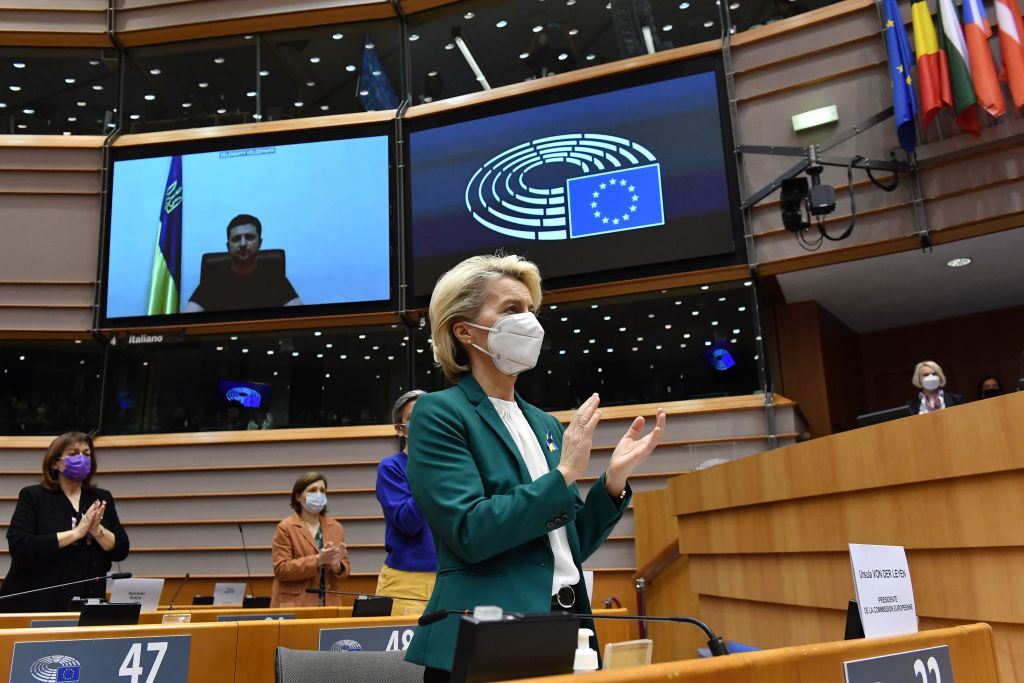EU ambassadors to call for 'initial assessment' of membership for Ukraine


A free daily email with the biggest news stories of the day – and the best features from TheWeek.com
You are now subscribed
Your newsletter sign-up was successful
In a "mostly symbolic" decision, European Union ambassadors on Tuesday agreed to "call for an initial assessment of Ukraine's chances of joining the 27-nation bloc," Bloomberg reports.
The ambassadors will now report back to the European Commission to further identify the possibility of Ukrainian membership. According to officials with knowlege of the matter, "EU leaders are expected to discuss Ukraine's prospects at a summit in Paris on March 10-11," Bloomberg writes.
Ukrainian President Volodymyr Zelensky had initially put in a formal membership bid on Monday.
The Week
Escape your echo chamber. Get the facts behind the news, plus analysis from multiple perspectives.

Sign up for The Week's Free Newsletters
From our morning news briefing to a weekly Good News Newsletter, get the best of The Week delivered directly to your inbox.
From our morning news briefing to a weekly Good News Newsletter, get the best of The Week delivered directly to your inbox.
Even with the move in Ukraine's favor, the road ahead remains long. In fact, the process of accepting a new member can last for over a decade, Bloomberg notes. The EU could agree to speed things up, given the dire situation in Kyiv, but there is still apparently "little chance" of the country rapidly securing so-called accession, Bloomberg writes, per an official.
Already, however, Ukraine has "received strong support from some member states," Bloomberg notes. The leaders of Bulgaria, the Czech Republic, Estonia, Latvia, Lithuania, Poland, Slovakia, and Slovenia, for example, in a letter called for the EU to open an immediate accession path for Ukraine.
Now that the ambassadors have called for an assessment, "it will be up to the commission to determine if [Ukraine] is ready to start the accession process," Bloomberg explains. Afterward, EU member states will make the final call on whether or not to move forward, once presented with the commission's findings.
A free daily email with the biggest news stories of the day – and the best features from TheWeek.com
Brigid Kennedy worked at The Week from 2021 to 2023 as a staff writer, junior editor and then story editor, with an interest in U.S. politics, the economy and the music industry.
-
 Nuuk becomes ground zero for Greenland’s diplomatic straits
Nuuk becomes ground zero for Greenland’s diplomatic straitsIN THE SPOTLIGHT A flurry of new consular activity in the remote Danish protectorate shows how important Greenland has become to Europeans’ anxiety about American imperialism
-
 ‘This is something that happens all too often’
‘This is something that happens all too often’Instant Opinion Opinion, comment and editorials of the day
-
 House votes to end Trump’s Canada tariffs
House votes to end Trump’s Canada tariffsSpeed Read Six Republicans joined with Democrats to repeal the president’s tariffs
-
 The mission to demine Ukraine
The mission to demine UkraineThe Explainer An estimated quarter of the nation – an area the size of England – is contaminated with landmines and unexploded shells from the war
-
 The secret lives of Russian saboteurs
The secret lives of Russian saboteursUnder The Radar Moscow is recruiting criminal agents to sow chaos and fear among its enemies
-
 Is the 'coalition of the willing' going to work?
Is the 'coalition of the willing' going to work?Today's Big Question PM's proposal for UK/French-led peacekeeping force in Ukraine provokes 'hostility' in Moscow and 'derision' in Washington
-
 Ukraine: where do Trump's loyalties really lie?
Ukraine: where do Trump's loyalties really lie?Today's Big Question 'Extraordinary pivot' by US president – driven by personal, ideological and strategic factors – has 'upended decades of hawkish foreign policy toward Russia'
-
 What will Trump-Putin Ukraine peace deal look like?
What will Trump-Putin Ukraine peace deal look like?Today's Big Question US president 'blindsides' European and UK leaders, indicating Ukraine must concede seized territory and forget about Nato membership
-
 Ukraine's disappearing army
Ukraine's disappearing armyUnder the Radar Every day unwilling conscripts and disillusioned veterans are fleeing the front
-
 Cuba's mercenaries fighting against Ukraine
Cuba's mercenaries fighting against UkraineThe Explainer Young men lured by high salaries and Russian citizenship to enlist for a year are now trapped on front lines of war indefinitely
-
 Ukraine-Russia: are both sides readying for nuclear war?
Ukraine-Russia: are both sides readying for nuclear war?Today's Big Question Putin changes doctrine to lower threshold for atomic weapons after Ukraine strikes with Western missiles
